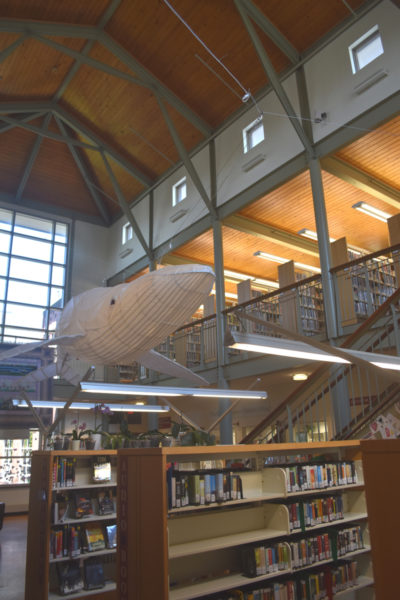
Matthew Graff, executive director of Skidompha Public Library in Damariscotta, sits in his office. “I want to do better by our patrons. But at this moment, because of this situation, we’re not able to,” Graff said on Friday, June 21, referring to an interruption to interlibrary lending services that will affect libraries across Maine this summer. (Molly Rains photo)
This summer, an administrative disruption will lead to a pause in interlibrary lending across Maine. How long it will last is still unclear, but the announcement has left Lincoln County library officials frustrated and patrons already feeling the impact.
“It’s very disappointing, because interlibrary loans are a cornerstone, foundational service of libraries,” said Matthew Graff, executive director of Skidompha Public Library in Damariscotta, on the afternoon of Friday, June 21. “It is one of the main things we do and are proud of.”
Through interlibrary loans, commonly referred to as ILLs, patrons can borrow items from other libraries by way of their own home library, allowing them to access a broad assortment of materials without the need for every library to curate a vast, expensive collection.
Many libraries within the Maine State Library network rely on a courier service, hired by the state, to send and receive interlibrary loans materials. The process of renewing a courier contract was interrupted this year, leading to the hiatus in service, according to information provided by the Maine State Library.
As a result, van delivery and transport of materials among libraries will halt for at least six weeks in fiscal year 2025, which begins on Monday, July 1. Ahead of the disruption, libraries across Lincoln County and the rest of Maine that use the courier service to exchange materials have already stopped offering interlibrary lending, attempting to return as many library materials to their original homes as possible before van service stops.
Reached by email on June 20, Maine State Librarian Lori Fisher said the Maine State Library “unfortunately” could not provide any further comment due to “pending litigation.”
Some Maine libraries that conduct interlibrary lending via the U.S. Postal Service, rather than the courier, will not be directly affected, such as Whitefield Library, according to Director Suzanne Balbo.
Lincoln County librarians agreed that interlibrary lending is central to libraries’ ability to do what they do best: serve as a bridge between their patrons and a broad range of books, movies, and other media, with as few restrictions as possible.
Under ordinary circumstances, patrons of participating libraries can take advantage of interlibrary loans for free, requesting items through their home library that lie outside its collection. The items are then delivered to the requester’s library for check-out.
“ILL widens what’s available to us and helps us stretch our budget,” said Cathrina Skov, executive director of the Waldoboro Public Library. “It helps us expand what’s available.”
In Waldoboro, Skov said, interlibrary lending had been increasing in popularity ahead of the interruption.
“Everyone was just getting used to the system – and now it’s getting shut down,” she said.

The stacks at Skidompha Public Library in Damariscotta. The library has over 35,000 items in its physical collection, according to Executive Director Matthew Graff. (Molly Rains photo)
The Whitefield Library, which conducts interlibrary loans through the mail, has only offered the service since September 2023. Already, the library has benefitted from the network, Balbo said.
“It alleviates, on our end, the need to have every current popular book in our collection,” she said. “It allows us to continue to curate our collection to best suit our community’s needs, and know that there are so many libraries with larger budgets that allow our patrons to have access to those books.”
How long the interruption will last is unclear.
“It is unknown at this time how much of a gap in service there will be, due to the ongoing appeal process,” according to a post on the Maine State Library service website.
The Maine Division of Procurement Services, which facilitates purchasing decisions and competition among vendors for the state, granted a stay and appeal to “an unsuccessful bidder” on May 17, according to the Maine State Library. This initiated an appeal process that will prevent Maine State Library from formally entering into a contract with their chosen bidder – STAT courier, based in St. Louis, Mo. – until the legal process is complete.
Graff said that the uncertainty involved in waiting to hear results of the appeal process was another source of frustration for local libraries.
“I trust that Maine State Library can defend their decision, but that’s not a certainty,” he said.
If the unsuccessful bidder’s appeal is upheld, next steps for the state – and the resulting impact on local libraries – are unclear.
“I have no idea where that leaves us,” Graff said.
Regardless of the interruption’s duration, its onset at the beginning of summer, as Lincoln County and its libraries are typically at their busiest, has made the interruption even more obtrusive, Skov and Graff said.
Up to 400 patrons might pass through the doors each day at Skidompha at the season’s height, Graff said, and interlibrary loan requests increase similarly this time of year.
“The timing is awful … It’s very disruptive,” he said.
Patrons will still be able to check out resources that libraries have on-site, and take advantage of programs like reciprocal borrowing, which allows patrons to use their home library card to check out materials from other participating libraries in-person.
Not all libraries, however, participate in reciprocal borrowing, and without van service, patrons will likely have to return books to the same library they borrowed from, Graff said.
Even for Whitefield Library, which can still conduct interlibrary loans through the Postal Service, the change has had an impact. Part of that is positive: an increased awareness and utilization of the library’s interlibrary loans services, Balbo said.
“Since I’ve posted publicly that we’re still doing it, ILL requests have skyrocketed,” she said.
While Balbo is glad patrons are utilizing the service, it isn’t free. Whitefield Library must pay postage at an average cost of $4.13 per item. Since initiating interlibrary loans service in September, the library has seen about three to 10 requests monthly, already consuming the $150 initially earmarked for the service in this year’s budget.
Mail service is also slower than van service, with patrons sometimes waiting two to three weeks for their requests, according to Balbo. Patrons, however, don’t seem to mind, she said. For a library the size of Whitefield’s, mail service is still cheaper than the preliminary prices under negotiation for the new van delivery contract.
This is another challenge to Whitefield resulting from the shake-up: the library had initially hoped to someday join the courier service, but the projected cost increases currently under negotiation could make the program unfeasible for small libraries like Whitefield, Balbo said.
“This has changed our plans,” she said. “Unless this drastically changes, we will stick with mail service.”
According to the materials released by Maine State Library, the cost will be increasing for all libraries that want to take part in van delivery service. Under the current contract, qualifying public libraries get one day of free van service each week. Though this will remain the case through fiscal year 2025, libraries will be required to pay for the service beginning in fiscal year 2026, at rates determined by what Maine State Library referred to on their website as a “very reasonable sliding scale.”
Graff said that some of his concerns about the change stemmed from these cost increases, including the fact that STAT courier, to which the contract was awarded, listed a bid price of $984,048 for delivery across the state, $244,868 or 33.13% higher than the lowest bidder and previous vendor, Freedom Xpress.
Skov and Graff said their libraries had not experienced issues with Freedom Xpress.
“We were really happy with the van delivery that we had. I don’t know why they were looking for a change,” Skov said.
Graff agreed, but acknowledged that there were a range of factors listed in the RFP contributing to the change in vendor, and not all the details had been made public.
In the process utilized by Maine State Library to evaluate bids from different courier services, the cost of each bid was awarded 25 points on the evaluation scale – the minimum allowable amount of points for cost, according to state procurement protocol. Organization qualifications and experience was given 30 points on the consideration rubric, and scope of services offered was given 45 points, according to the request for proposals issued by Maine State Library.

The Waldoboro Public Library, on Main Street, is among those Maine libraries that will be affected by an interruption to interlibrary lending this summer. (Molly Rains photo)
The result of this decision making process, said Graff, could be cost increases to what was once a free, valued service for public libraries.
Graff, Skov, and Balbo also noted that they were informed of the interruption late in the contract-renewal process, and were instructed not to immediately tell patrons because of the ongoing legal process.
“I find it professionally embarrassing,” Graff said.
However, patrons are, generally, reacting understandingly, the directors noted.
“We’ve heard from some disappointed people, but, so far, no angry ones,” Skov said.
While libraries wait for the situation to be resolved, Skov added, Waldoboro patrons can explore the library’s in-house collection, which numbers 25,000 physical items.
“There’s plenty to read,” Skov joked.
At Skidompha, Graff noted, there are a cumulative 1,070,762 items available, including both physical items – which number around 35,000 – and digital materials available through Cloud Library and Hoopla, which Skidompha pays for patrons to use.
“I am very proud of the job our librarians have done in building these collections,” Graff said.
Patrons can also take advantage of library programming, like library classes and groups, at libraries across Lincoln County throughout the summer.
As the disruption progresses, Graff said, there is not much left for libraries to do but wait for more information.
“We have to trust the process,” he said, “and wait.”



